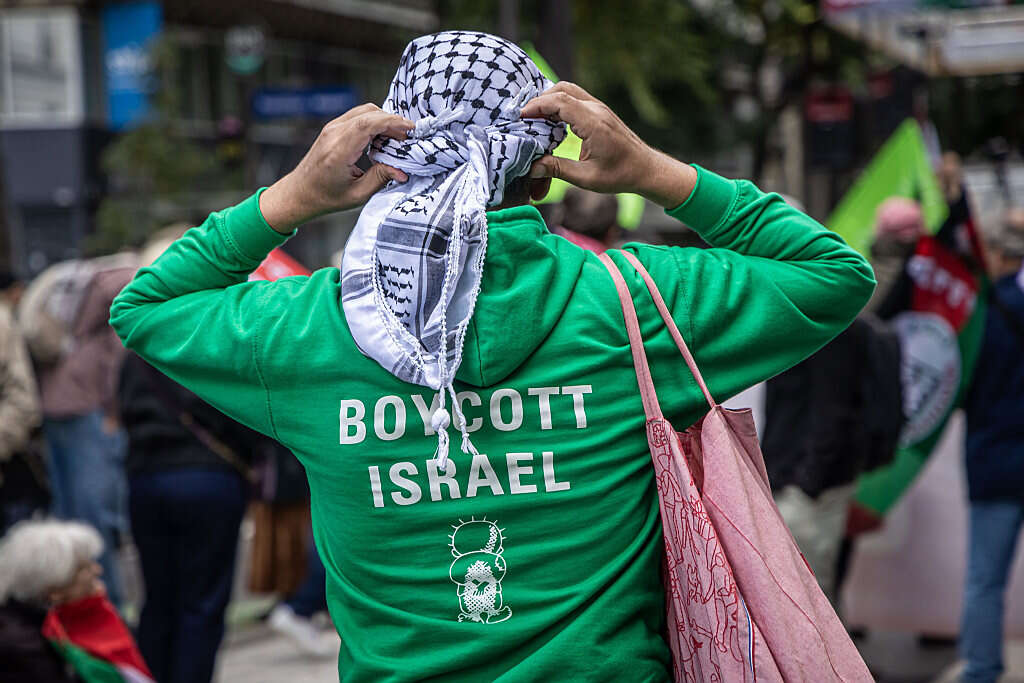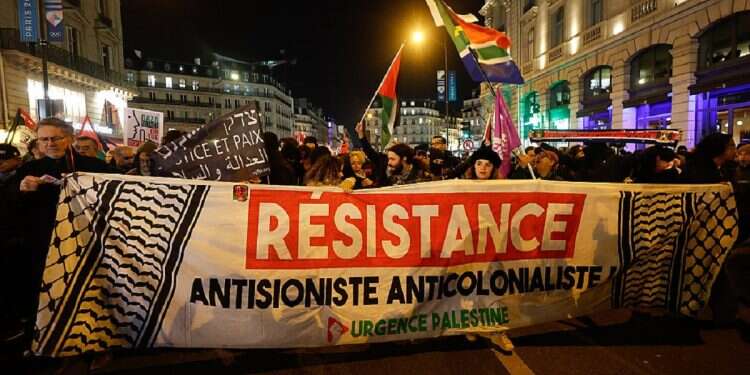"I understand Jews who question whether we can still live in Europe or if we should seek refuge elsewhere, including Israel. This is a critical issue not just for France but for all of Europe," Caroline Yadan, a Jewish member of the French Parliament said. "Most Jews in France are no longer asking if they should leave, but when. However, I believe that in the face of pure evil, we must continue to fight. Leaving means ceding territory to those who propagate antisemitism."
Yadan, 56, who proudly identifies as a Zionist, represents Paris' 8th district. Now serving her second term in the National Assembly, she succeeded former parliament member Meir Habib. Born to parents of Tunisian and Polish heritage, she is married with three children. Her support for Israel is unwavering and public. She recently demonstrated this by bringing an Israeli flag to Eurosatory, the world's largest defense exhibition, to protest what she termed an illegal boycott against the Israel Defense Forces (IDF).
Last weekend's riots in Amsterdam following the Maccabi Tel Aviv match have intensified Yadan's already serious concerns.
Q: How would you describe the atmosphere among French Jews over the past year, particularly after the Amsterdam attacks?
"The mood is somber and tense. The resurgence of antisemitism in France mirrors a disturbing trend we're seeing across Europe and in the US. The Jewish community is deeply concerned, and many feel compelled to hide their identity in public – a situation that's simply unacceptable in our society."
Q: Some suggest the Amsterdam attacks were merely a preview of what could unfold in Paris. What's your perspective?
"The events in Amsterdam could easily occur at any moment on the streets of Paris, London, or Madrid. We're witnessing levels of hatred toward Jews unprecedented since the Holocaust. A dangerous double standard is at work, allowing antisemites to justify their attacks by casting victims as perpetrators. When Jews are portrayed as criminals, instigators, or supporters of genocide, some people see it as justification for violent attacks. This calculated process, involving the corruption of language and carefully crafted rhetoric, must be exposed and condemned."
Q: Who bears responsibility for these actions?
"These attacks reflect a deeper problem in Europe, which for years has failed to take necessary action against evolving forms of antisemitism, particularly those fueled by hatred of Israel. This lack of decisive response has led us to the horrors we face today. These aren't simple clashes between opposing groups – they're coordinated, targeted actions aimed specifically at harming Jews."

Q: Are European nations reconsidering their open immigration policies?
"Several months ago, our National Assembly passed legislation that significantly tightens both immigration requirements and integration standards for our country. Immigration remains a hotly debated topic at both national and European levels. New legislation on this matter will soon come before the National Assembly. Clearly, addressing illegal immigration must be among our highest priorities."
Yadan, a member of President Emmanuel Macron's Renaissance party, hasn't shied away from criticizing the president despite potential political consequences. She's openly challenged his statements about imposing an arms embargo on Israel and his characterization of Palestinian evacuation from Rafah as "genocide." She has previously noted her difficulty understanding some of his pronouncements, which have shocked many in both Israel and France, well beyond the Jewish community. In her view, "his strained relationship with Netanyahu influences his positions,along with his desire to end the war and civilian suffering."
Speaking to Makor Rishon, she elaborates: "We must distinguishbetween the president's statements and the position of both the Renaissance party and our parliamentary group, 'Together for the Republic group.' This reflects the fundamental separation between the executive branch – the president and his government – and the legislature. As a member of parliament, I speak independently and freely. I felt compelled to publicly distance myself from the president's recent comments, even sending him an open letter emphasizing the weight his words carry.
"Our parliamentary group in the National Assembly, under Gabriel Attal's leadership, takes a different stance. Attal recently met with Israel's ambassador to France, Joshua Zarka, to express unwavering support for Israel and affirm its right to self-defense. Following the Iranian attack, the Renaissance party reaffirmed its commitment to Israel's security. It's worth remembering that France stood with Israel as part of the military coalition during Iran's recent attacks."
Q: Tell us about your parliamentary efforts to combat the delegitimization of Israel and antisemitism.
"Fighting antisemitism has been my mission for 35 years, likely influenced by my family background. Since entering parliament, I've pursued this battle relentlessly. Recently, I proposed legislation aimed at confronting modern forms of antisemitism, including penalties for calling for Israel's destruction. I've also proposed two additional provisions to address contemporary antisemitism, which often masks itself as anti-Israel sentiment: expanding laws against inciting and glorifying terrorism, and prohibiting comparisons between Israel and the Nazi regime.
"I'm also challenging the far left, particularly Jean-Luc Mélenchon's LFI party, which has embraced antisemitic positions and weaponized hatred of Jews for political gain. The far left has become an aggressive faction that we must confront systematically."
Q: What's the status of your proposed legislation regarding anti-Israel content in Palestinian textbooks and making French citizenship conditional on recognizing Israel's right to exist?
"The antisemitism bill remains my top priority. My second priority is the resolution addressing the anti-Israel incitement found in Palestinian educational materials, which I introduced in the previous session. I'm also working to make recognition of Israel's right to exist a prerequisite for French citizenship. My goal is to build broad, cross-party support for these initiatives in the National Assembly."
Q: How is France's political crisis affecting Jewish citizens and French-Israeli relations, and what impact is Mélenchon's far-left having?
"LFI has emerged as France's primary vehicle for antisemitism. Mélenchon and his allies enable antisemitism to flourish by echoing Hamas' rhetoric, which they frame as resistance. They bear significant responsibility for the climate of fear affecting our Jewish community. I was appalled, for instance, by party member Marie Mesmeur's tweet justifying the Amsterdam attacks against Jews by labeling Israel's supporters as racists and genocide advocates. The interior minister has requested criminal charges against her for inciting hatred.
"It's reprehensible to endanger lives based on assumed beliefs about people's origins. We're seeing collective guilt assigned to an entire people to justify violence in the name of fighting oppression. Violence is being portrayed as necessary against so-called 'genocide perpetrators' – meaning Israelis, and by extension, Jews in general. The left has undergone a transformation where they not only incite but actively justify violence against Jews."
Q: How can we effectively combat antisemitism? What can be done about pro-Palestinian organizations?
"Given the scale of this problem, victory requires broad societal mobilization. I'm working to lead this effort by building the widest possible parliamentary support. More than a hundred Assembly members from across the political spectrum, including a former president, have co-signed my antisemitism bill. Last August, I secured over fifty signatures for a motion to strip parliamentary immunity from and sanction Rima Hassan, a far-left representative and Syrian native who denied the Oct. 7, 2023 massacre.
"Regarding groups that continue to incite hatred and violence against Israel, and by extension against Jews, I will persistently advocate for disbanding organizations like 'Samidoun,' a Palestinian prisoner support network that backs terror organizations like Hamas and Hezbollah. This comprehensive approach is the only way to overcome this epidemic."




